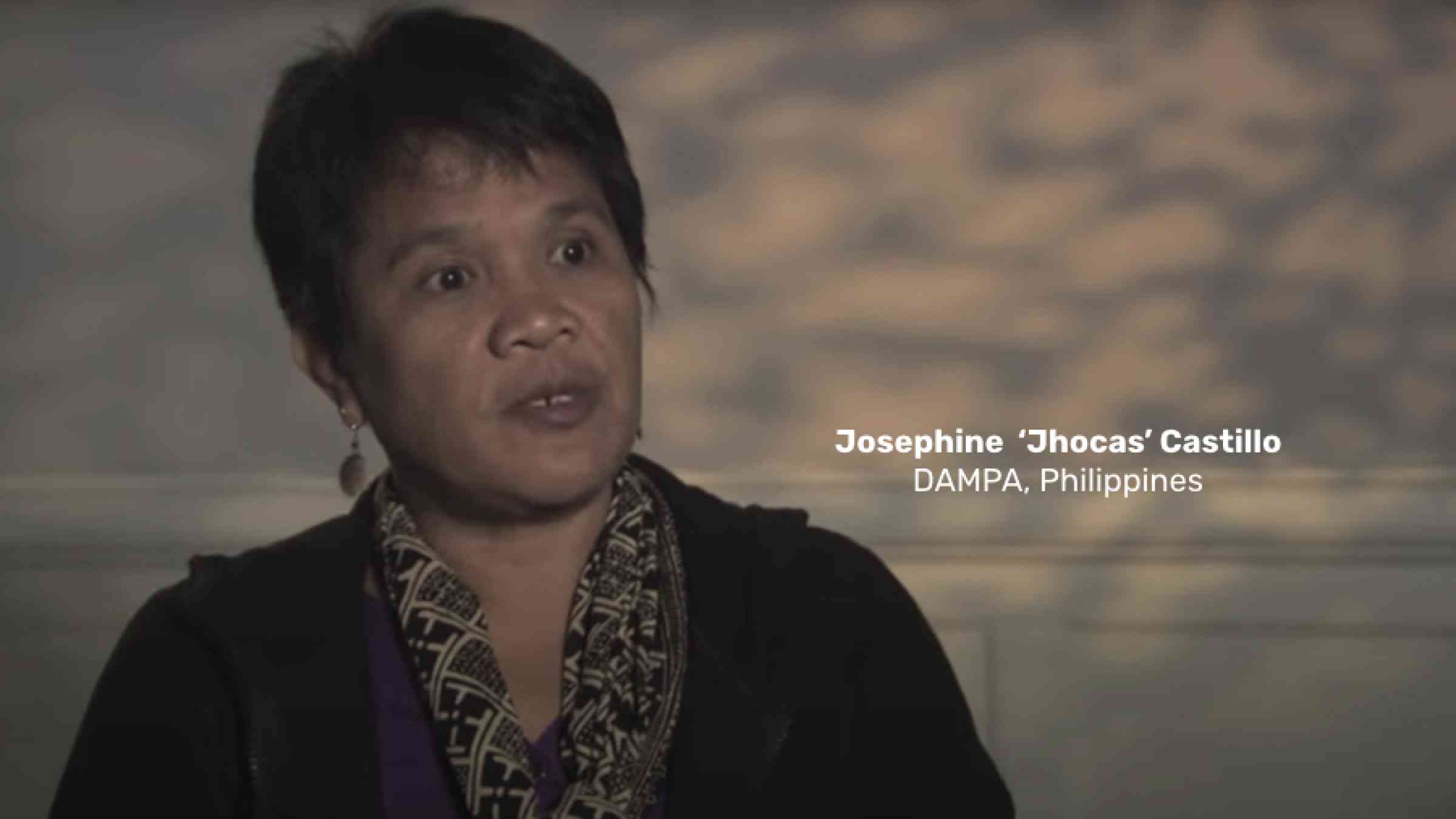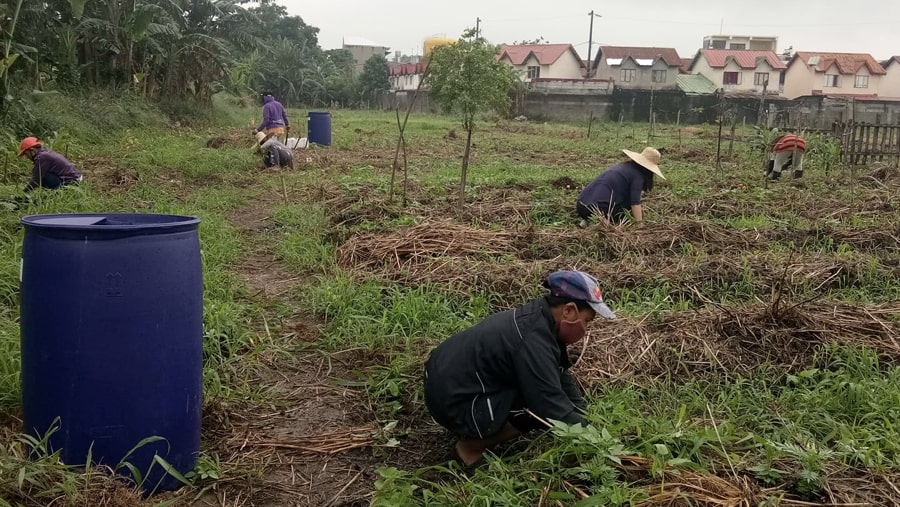Please help us improve PreventionWeb by taking this brief survey. Your input will allow us to better serve the needs of the DRR community.
Josephine Castillo: “Our relationship becomes stronger because we support each other”

Josephine Castillo ‘Jhocas’ helped start DAMPA after the demolition of a division of settlements of urban poor in Manila in the 1980’s. What started as a network of 17 groups now has 67 grassroots women organizations nationwide. The network connects and empowers grassroots women leaders and shares best practices to engage in coordinated policy reform and transform communities by building resilience.
“We organize grassroots women's communities,” she says. “We give capacity building to our members and leaders. We support networking, alliances and coalition-building. We help them set up advocacy for better policies.”
Jhocas says the network is a source of support to its members. She says savings mechanisms established by members have helped with food security during lockdowns. Instead of waiting for relief goods or assistance from the government, women used the savings to buy food and distribute it to their members.
“Some of our members use their savings to set up businesses, like face-mask making and egg-laying,” she says. “We were noticing that women were feeling unstable or vulnerable because they didn't have that kind of stability, but our network was able to support them. It has been useful during this pandemic, especially in urban areas.”
She says the pandemic has hit hard in the communities where she works. “Many of our members are jobless.”

Jhocas says it is not only about livelihoods, it is about food security, and access to resources and education. “During lockdown, the mobility of our grassroots communities was limited,” she says. “We are well organized and even though what we’re providing is small things and resources, it can help a lot in terms of securing food for our member families.”
Jhocas emphasizes that the network of support needs to be built before a crisis happens. In order for that network to be in place, community organizations need support from partners with a long-term vision of resilience. Jhocas says development organizations need to spend more time learning from grassroots organizations. The DAMPA network is recognized at local and global level and she says that recognition has helped them access programs and partnership with different institutions.
“For holistic resilience,” she says, “grassroots communities must be involved in making recovery plans.”
Jhocas says consultation is critical. “We should be consulted from the start,” she insists. “All the processes from the consultation to the implementation. We must be there, our presence must be there from the start so our voices can be heard.”
She says women in the community can help partners better identify vulnerabilities. “We are the ones who are in the community so we know what we need,” Jhocas says. “Resilience building plans must be inclusive.”

The savings and food banks have been a lifeline for members and Jhocas says the network is also providing a place of support for survivors of gender-based violence.
“There's a lot of violence against women's happening during lockdown during the pandemic,” she says. “Since the lockdown started we have had a communication platform from the local organization to the national level,” she says. “We have Zoom meetings within the local organizations, within the organization, within the city and on a national level.”
The meetings help them monitor what is happening to fellow members and help them access support.
The network also started to partner with government agencies to share public health messages about COVID-19 with members.
Jhocas says engaging the local government to listen to women’s concerns is a key part of the process. “We do holistic organizing,'' Jhocas says. “We're not only involving the women, we involve all genders. We involve different sectors of the community: older people, young people, men and women.”

Jhocas is proud of how well they have organized. “I'm a Filipina but I think the Philippines is good at organizing,'' she says. ”It's very important that the communities are organized. We can make our voices heard from the local level; you need teachers at the community level”.
She says social media has played an important role during the pandemic. “We taught some women how to use a smartphone to be a part of the webinars or Zoom meetings,” she says. “It was not a problem for our organization to communicate and implement projects during the pandemic.”
Maintaining communication networks also presented opportunities for inter-generational collaboration.
“Young people must be organized,” she says. “Millennials are the ones who are good at the technology that we have now. They help the seniors to learn. It's very important to have continuous communication, especially during this pandemic.”
Jhocas says communities have to use technology to stay informed about risks. Despite the ongoing pandemic lockdowns, Jhocas knows that her sisterhood of support is always there.
“Even though it’s online, our relationship becomes stronger because we support each other,” she says.
“If there are some problems they will just call. Then we will have a conference and then talk about what is the best way to handle it. That's the moral support that we are giving to our community.”
Join the Women’s International Network on Disaster Risk Reduction
The Women's International Network on Disaster Risk Reduction (WIN DRR) is a professional network to support women working in disaster risk reduction, in all their diversity. WIN DRR promotes and supports women's leadership in disaster risk reduction across the Asia Pacific region, and aims to reduce the barriers faced by women and empower them to attain leadership and enhance their decision-making in disaster risk reduction. WIN DRR is supported by UNDRR and the Government of Australia.
Learn more about Jhocas’s work
Q&A: Disaster Resilience Starts with Grassroots Women
“Participation of women in all process on adaptation capacity building climate action"
Building Resilient Communities: DAMPA* Experience
Josephine Castillo is grassroots community leader and organiser with DAMPA in Manila, Philippines. DAMPA is the Tagalog (a local Philippine dialect) word for a poor person's home. An organizational acronym which roughly translates to Solidarity of Poor Filipinos.
Explore further
Please note: Content is displayed as last posted by a PreventionWeb community member or editor. The views expressed therein are not necessarily those of UNDRR, PreventionWeb, or its sponsors. See our terms of use
Is this page useful?
Yes No Report an issue on this pageThank you. If you have 2 minutes, we would benefit from additional feedback (link opens in a new window).